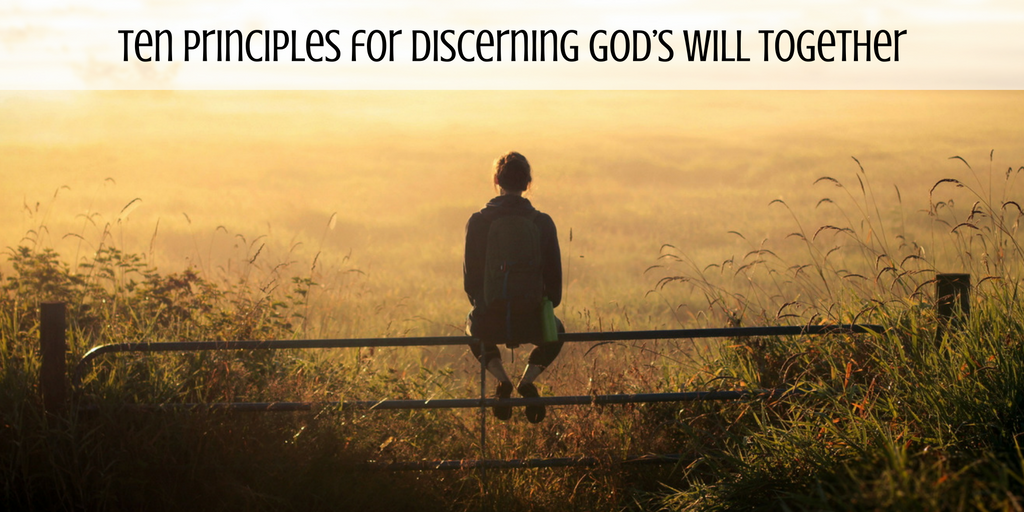Ten Principles for Discerning God’s Will Together
 Whether it’s with a ministry team at church or with our own family, we regularly find ourselves trying to discern God’s will with others. In this blog, I will outline ten principles for helping us find God’s way together.
Whether it’s with a ministry team at church or with our own family, we regularly find ourselves trying to discern God’s will with others. In this blog, I will outline ten principles for helping us find God’s way together.
Principle #1 – Encourage Spiritual Growth
It’s important that we recognize that what people bring into a decision-making forum will influence the quality of their contributions. Those in a growing relationship with God will be in a better position to hear from Him. As people develop character that aligns more closely with Christ, their decisions will also become more consistent with Christ’s character (see my post called Character – The Defining Characteristic of Authentic Leadership for an explanation). As we build each other up in Christ, we will make wiser, more God-honouring decisions.
Principle #2 – Pray Before, During, and After Decision-Making Meetings
We desperately need to hear from God. Prayer strengthens our communication link with Him. As we ask God for wisdom, He will guide us. Prayer also connects us to the One who will give us the strength and courage to live out His calling (see my post called Living Out God’s Call).
Principle #3 - God Speaks in Many Different Ways
As we pray, discuss, debate, and plan, let’s be open to God’s still small voice breaking through in unexpected ways.
Principle #4 - Build Diversity Before Driving to Consensus
Groups often push for consensus too quickly. Give people time and space to contribute their unique perspectives. Explore many options. Then, prayerfully discern how God is beginning to shape some of the ideas into a cohesive sense of direction.
Principle #5 - Hearing Multiple Perspectives Can Grant Greater Clarity about the Situation and Possible Solutions
We know from Scripture that, “Plans fail for lack of counsel, but with many advisers they succeed” (Proverbs 15:22). Of course, this passage assumes that we actually hear from the advisers around us. In group decision-making, this means that we need to employ mechanisms that allow people to contribute meaningfully as equal participants in the discernment process.
Principle #6 - Guard Against Groupthink (which often leads to Groupsink)
One of the ways to overcome groupthink is to encourage people to express ideas outside the group norms (like in an open brainstorming time). Do not discount outlying ideas, but allow them to agitate people towards better solutions.
Principle #7 - Harness the Restless Tension that Accompanies Conflict to Propel the Group Toward Better Solutions
Most people do not enjoy conflict. When navigating through the tension of conflicting ideas, we will often stretch ourselves to find a resolution. Capitalize on this desire by welcoming healthy conflict and using it to unleash creative explorations of new possibilities.
Principle #8 - Embrace Complexity and Chaos Long Enough to Understand Most of the Issues (and Landmines), so that the Group Can Move in the Best Possible Direction
Integrative thinking is “the ability to face constructively the tension of opposing ideas and, instead of choosing one at the expense of the other, generate a creative resolution of the tension in the form of a new idea that contains elements of the opposing ideas but is superior to each” (Roger Martin in Opposable Mind: Winning through Integrative Thinking). This kind of thinking requires us to dwell in the uncomfortable world of complexity, ambiguity, and fragmentation long enough to see how the pieces could fit together. Giving people time to process together and on their own will often lead to better decisions. It’s important that we don’t let a false sense of urgency or an unwillingness to embrace chaos (for a while) lead us to make poor decisions.
Principle # 9 - Use Good Coaching Questions to Expand Awareness
Whether you are the group facilitator or a group member, ask questions that get you and others in the group thinking in new ways (this isn't as difficult as you might think).
Principle #10 - For Complex Decisions, Implement a Rigorous Process that Allows for Prayerful and Careful Consideration of Multiple Options
In my work with governance boards and other groups, I use a decision-making framework called, “A Discernment Process for Making Complex Decisions” (include a link to the document). The full process has eight steps: identify issues, clarify personal and professional values, clarify influencing factors and barriers, identify guiding ethical and legal principles, analyze alternatives, find common ground, decide and act, and assess outcomes. I have found that it is an excellent way of exploring issues in a thorough and objective way that gives all group members an opportunity to contribute in a meaningful way.
What are some other principles or approaches that you have found helping in making good group decisions?
Randy Wollf is the Director of MinistryLift and the Assistant Professor of Practical Theology and Leadership Studies at MB Seminary. He gave a presentation in MinistryLift's Building Healthy Boards series called Making Good Decisions: Discerning God's Will Together Even in the Midst of Conflict.
